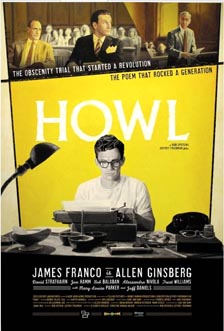
Starts January 6
 There are three stars in this film: Alan Ginsberg (James Franco), the young poet whose words graphically and allegorically reflect his deepest emotions, Lawrence Ferlingehetti (Andrew Rogers) on trial for daring to publish Ginsberg’s work, and Howl, the four-part poem that caused the ruckus and pushed the boundaries of what in 1957 was deemed ‘acceptable’ Freedom of Speech in the U.S.A.
There are three stars in this film: Alan Ginsberg (James Franco), the young poet whose words graphically and allegorically reflect his deepest emotions, Lawrence Ferlingehetti (Andrew Rogers) on trial for daring to publish Ginsberg’s work, and Howl, the four-part poem that caused the ruckus and pushed the boundaries of what in 1957 was deemed ‘acceptable’ Freedom of Speech in the U.S.A.
As a young Ginsberg recites Howl, it comes to life through extraordinary, intelligent animation that encapsulates and reflects the poems novelty. Intertwined, an older Ginsberg talks to an interviewer about those aspects of his personal life that inspired his avant-garde voice, including friendships with Jack Kerouac and Neal Cassady and his relationship with Peter Orlovsky, and powerful scenes from the obscenity trial. It may seem ludicrous to some in the audience now, but without the brilliancy of Ferlingehetti’s attorney Ralph McIntosh (David Strathairn) and the wisdom of Judge Clayton Horn (Bob Balaban), speech as we freely use it would have been compromised, and a counter-culture quelled.
Written and directed by Rob Epstein & Jeffrey Friedman, the performances are strong. Cinematographer Edward Lachman distinguishes between 1957 and present day using B&W and color footage respectively, which Editor Jake Pushinsky finely balances with archival footage. The Monk Studios, Thailand animation brilliantly breathes life into a poem that would be otherwise impossible to graphically depict without the film being labeled pornographic. This absorbing film illuminates a man, his work, and his times, with a suspect whisper as to whether Ginsberg would have achieved such fame, without the trial.
